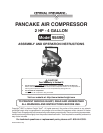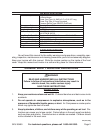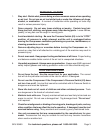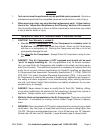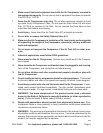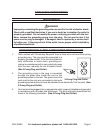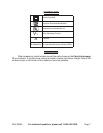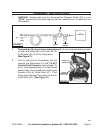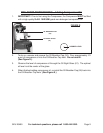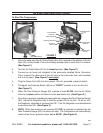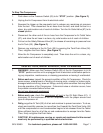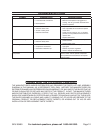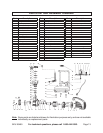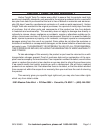
Page 3SKU 95499
For technical questions, please call 1-800-444-3353.
PERSONAL SAFETY
Stay alert. Watch what you are doing, and use common sense when operating 1.
an air tool. Do not use an air tool while tired or under the influence of drugs,
alcohol, or medication. A moment of inattention while operating air tools may
result in serious personal injury.
Dress properly. Do not wear loose clothing or jewelry. Contain long hair. 2.
Keep your hair, clothing, and gloves away from moving parts. Loose clothes,
jewelry, or long hair can be caught in moving parts.
Avoid accidental starting. Be sure the Pressure Switch (63) is in its “STOP” 3.
position, all pressure is safely released, and the unit is unplugged before
moving the Compressor and before performing any service, maintenance, or
cleaning procedures on the unit.
Remove adjusting keys or wrenches before turning the Compressor on. 4. A
wrench or a key that is left attached to a rotating part of the machine may result in
personal injury.
Do not overreach. Keep proper footing and balance at all times. 5. Proper footing
and balance enables better control of the air tool in unexpected situations.
Use safety equipment. Always wear eye protection. 6. Always wear ANSI-approved
safety impact glasses and hearing protection under a full face shield during use.
TOOL USE AND CARE
Do not force the tool. Use the correct tool for your application. 1. The correct
tool will do the job better and safer at the rate for which it is designed.
Do not use the Compressor if the Compressor’s Pressure Switch (63) does 2.
not turn it on or off. Any tool that cannot be controlled with its Pressure Switch is
dangerous and must be replaced.
Store idle tools out of reach of children and other untrained persons. 3. Tools
are dangerous in the hands of untrained users.
Maintain tools with care. 4. Properly maintained tools are less likely to bind and are
easier to control. Do not use a damaged tool. Tag damaged tools “Do not use”
until repaired.
Check for misalignment or binding of moving parts, breakage of parts, and any 5.
other condition that may affect the tool’s operation. If damaged, have the tool
serviced before using. Many accidents are caused by poorly maintained tools.
Use only accessories that are recommended by the manufacturer for your 6.
model. Accessories that may be suitable for one tool may become hazardous
when used on another tool.



